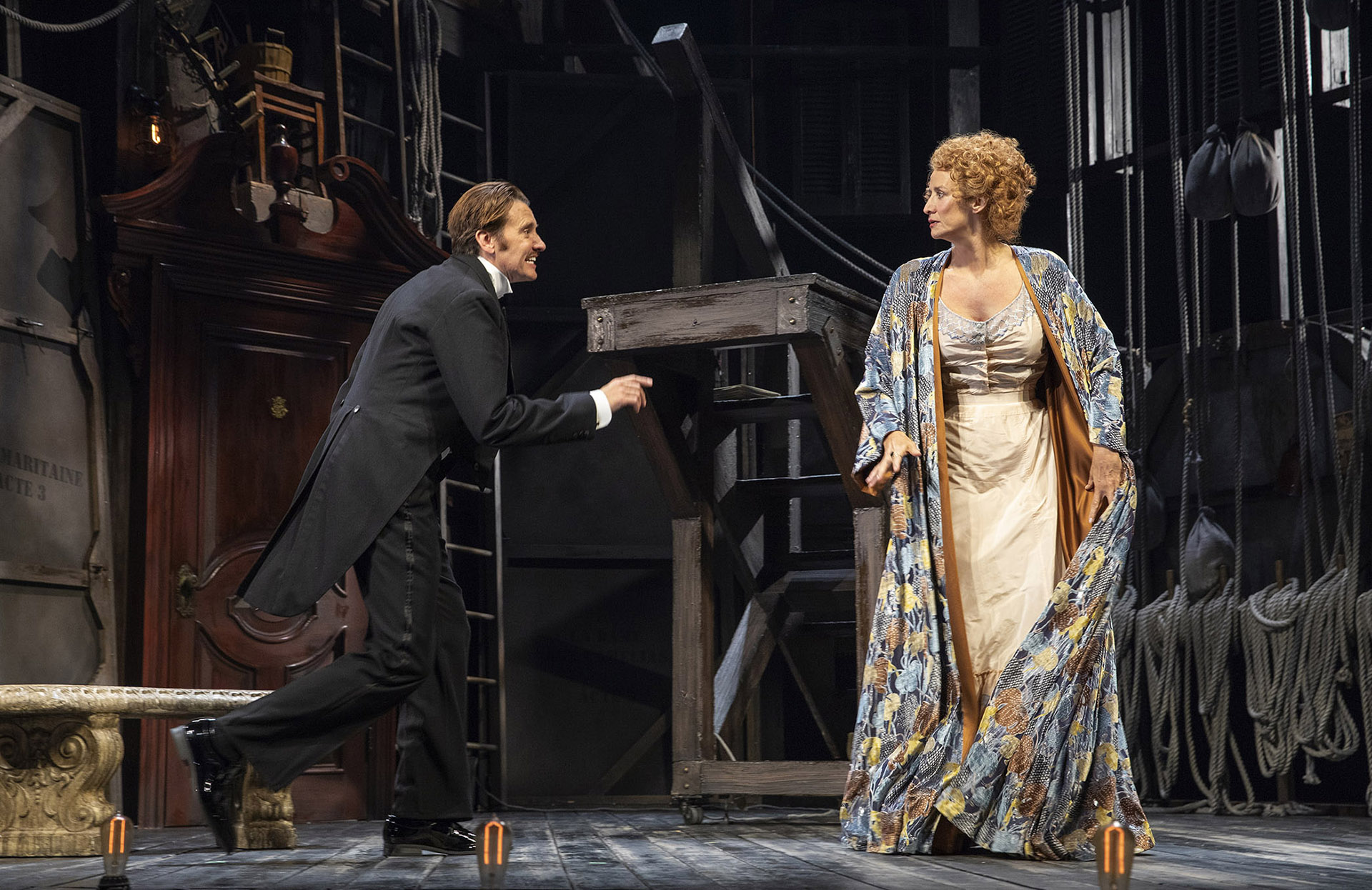Bernhardt/Hamlet Examines Female Roles

Play recounts actress’s ambition to be the first woman to play Hamlet
One should not be fooled by the title of the Roundabout Theatre’s current production, Bernhardt/Hamlet, by Theresa Rebeck. Regardless of the title, the soul-gripping center of this show is Janet McTeer, and what a whirlwind she is.
McTeer encompasses Sarah Bernhardt’s self-dramatizing style, her shameless self-promoting, her altogether eccentric nature, with utter aplomb. She’s wildly amusing.
And all the more so when, in Rebeck’s new play, the theatrical world rains misogyny on the most famous actress of the day. That was, in part, the reception Bernhardt received in 1899, when at the age of 55, she became the first woman to play Hamlet.
Not only did she play the role in a French adaptation, she also played it in London, and in Stratford. She even made the movie. No small roles, or small actors for Bernhardt!
Bernhardt’s ambition to play Hamlet unfolds here, side-by-side with her love affair with the French writer and playwright, Edmond Rostand. As a matter of fact, the stage door to her theater is plastered with a poster of her in his play La Samaritaine.
It’s a famous image, by the artist Alphonse Mucha. Still, she walks all over Rostand, in dominatrix fashion, when it comes to her demand that he “rewrite” Hamlet for her to make the poetry and the character more accessible to her, and more relatable for the audience.
In modern times, ideally, women would find more subtle ways of enforcing their will. Still, Rebeck makes the most of the volatile interplay between the two. The masculine side of the woman, and the feminine side of the man — in Jungian etymology, the animus and the anima — are fundamental concepts explored through their relationship.
Indeed, a large part of the second act is about Bernhardt’s quandary over playing Roxane in Cyrano de Bergerac, a role Rostand (Jason Butler Harner) wrote for her, according to his wife, Rosamond. In that role, Ito Aghayere is convincingly smooth, vulnerable, and coy.
But the argument between the playwright and the actress is very much to the point of this play.
EDMOND: Roxane is the embodiment of female perfection.
SARAH: If you like them pretty and silent.
For fans of the television series “Ozark,” it’s a wonderful opportunity to see two fierce opponents — the FBI agent (Harner) and a representative of the Colombian drug lord (McTeer) face off. The two actors ignite wonderfully here.
But more important, the historical setting is colorful and evocative of the outpouring about women’s roles today. As directed by Moritz von Stuelpnagel, McTeer achieves her #MeToo moment fairly early in Act II. “Of course he loved me in Camille!” she tells us. “All the men love the beautiful whore who is there to adore the prince and remind him of feeling and passion, then renounce him and conveniently die so he doesn’t have to sully himself with tawdry melodrama anymore when he needs to marry and pass on all that money to children who are, you know, unsullied.”
Rebeck’s play is based on historical characters. Dylan Baker is astonishingly comic and chameleon-like as the prominent French actor, Constant Coquelin. In the role of Alphonse Mucha, the artist who became famous for his portraits of Bernhardt, Matthew Saldivar occupies himself tirelessly in her employ. And Nick Westrate suitably portrays her doting, spoiled son Maurice. In this play, as in history, Sarah Bernhardt reigns.
Set amidst the bones of the stage, Beowulf Boritt’s design makes us feel like we really are in the guts of it all. And Bernhardt’s dressing room, with her collection of artifacts from around the world, is enchanting — an appropriate signature for a woman who was known to be truly exotic. Similarly, Toni-Leslie James’s costumes of both periods are character revealing, in and of themselves.
It’s in the shaping of a woman’s history that this story unfolds, ambitiously of course.
The Nap
Watching a bunch of grifters, in The Nap, is a guilty pleasure because it’s silly and delightfully inconsequential. It’s a comedy well timed for the zeitgeist.
Author of the popular Broadway farce, One Man, Two Guvnors, British playwright Richard Bean’s cockeyed whodunnit is the season opener at the Manhattan Theater Club’s main stage.
The titular Nap refers to the grain of the green cloth on snooker tables. Originally a British sport, snooker is like our game of pool, but its historical development and the culture that surrounds it are completely different. In modern times, it’s a worldwide sport, with championship matches and financial stakes.
As the play opens, Dylan Spokes (Ben Schnetzer), a successful professional snooker player, is practicing his game in a seedy Sheffield pub, and sharing tales with his ex-con dad, a sweetly appealing John Ellison Conlee. Sheffield, being the home of snooker, is a kind of mecca for the pub-centric sport.
Schnetzer’s Dylan is a wide-eyed, millennial-appealing vegetarian, whose innocence, it turns out, is a big draw for con artists. Enter the cops — a flirtatious young woman played by Heather Lind, and her consort, a threatening authority portrayed by Bhavesh Patel. Their story about match fixing places Dylan at the center of criminal activity, and threatens his career.
Director Daniel Sullivan drives this big game of fraud into a rabbit hole of deceit and misadventures, mining the farce with exquisite flare. One of the much-exaggerated characters who interact over the game include Max Gordon Moore as Dylan’s over-the-top agent. His physical comedy and bizarrely colored suits (Kaye Voyce) are loudly out of place in designer, David Rockwell’s seedy Sheffield pub. But that is just the start.
Johanna Day, a recognizable dramatic presence on many a New York stage, is totally unrecognizable here, as Dylan’s mother, Stella Spokes. Dressed really oddly, in bright yellow, with hair that dwarfs the rest of her, she plays the cheap and narcissistic mom of the sports star. Her partner in crime Danny Killeen (Thomas Jay Ryan) is filthy and indestructible in his pursuit of The Pound. And her ex-boyfriend, now transitioned into an elegantly beautiful woman, by the name of Waxy Bush, is Dylan’s sponsor. Their antics and manipulations are deft, and remain opaque, at least for a while.
Anyway, it’s full blown comedy, and a very well-acted farce flaunting innocence as well as romance. I, for one, felt completely snookered.



